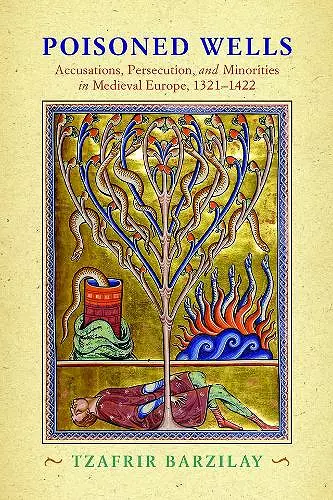Poisoned Wells
Accusations, Persecution, and Minorities in Medieval Europe, 1321-1422
Format:Hardback
Publisher:University of Pennsylvania Press
Published:22nd Mar '22
Currently unavailable, and unfortunately no date known when it will be back

Between 1348 and 1350, Jews throughout Europe were accused of having caused the spread of the Black Death by poisoning the wells from which the entire population drank. Poisoned Wells explains the origin of these allegations, how they gained popularity before and during the Black Death, and why they declined in the fifteenth century.
Between 1348 and 1350, Jews throughout Europe were accused of having caused the spread of the Black Death by poisoning the wells from which the entire population drank. Hundreds if not thousands were executed from Aragon and southern France into the eastern regions of the German-speaking lands. But if the well-poisoning accusations against the Jews during these plague years are the most frequently cited of such cases, they were not unique. The first major wave of accusations came in France and Aragon in 1321, and it was lepers, not Jews, who were the initial targets. Local authorities, and especially municipal councils, promoted these charges so as to be able to seize the property of the leprosaria, Tzafrir Barzilay contends. The allegations eventually expanded to describe an international conspiracy organized by Muslims, and only then, after months of persecution of the lepers, did some nobles of central France implicate the Jews, convincing the king to expel them from the realm.
In Poisoned Wells Barzilay explores the origins of these charges of well poisoning, asks how the fear took root and moved across Europe, which groups it targeted, why it held in certain areas and not others, and why it waned in the fifteenth century. He argues that many of the social, political, and environmental factors that fed the rise of the mass poisoning accusations had already appeared during the thirteenth century, a period of increased urbanization, of criminal poisoning charges, and of the proliferation of medical texts on toxins. In studying the narratives that were presented to convince officials that certain groups committed well poisoning and the legal and bureaucratic mechanisms that moved rumors into officially accepted and prosecutable crimes, Barzilay has written a crucial chapter in the long history of the persecution of European minorities.
"[A] compelling study of the well-poisoning accusations that underpinned horrific acts of violence against lepers, beggars, foreigners, and Jews during the middle decades of the fourteenth century. While these accusations have featured prominently in earlier studies of the so-called Lepers’ Plot of 1321 as well as the Black Death, Poisoned Wells presents the first systematic account of their emergence, elaboration, and afterlife. Through his persistent concern with the particularities of time, place, and documentary production, Barzilay both corrects many previous historiographical missteps and crafts a powerful account of the dynamics of persecution in the later Middle Ages." * The Medieval Review *
"With an enviable command of both primary and secondary sources, Tzafrir Barzilay meticulously documents the waves of violence that followed well-poisoning charges leveled against lepers, Jews, and other minority groups in Western Europe of the later Middle Ages." * Jeremy Cohen, Tel Aviv University *
- Winner of Winner of the Jordan Schnitzer Book Award in the category of Medieval and Early Modern Jewish History and Culture, granted by the Association for Jewish Studies 2023 (United States)
ISBN: 9780812253610
Dimensions: unknown
Weight: unknown
312 pages